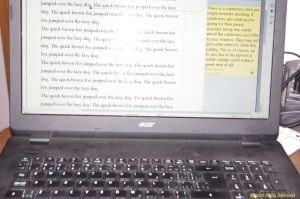
If you write, you edit.
There is no way around it.
Oh, you may think you don’t, many people write it down and leave it just the way it is. But they edited it as they were writing.
And if they didn’t go over it again, they made at least one mistake. Because even if you change nothing, going over your work provides you with the opportunity to assure yourself that the words you wrote said the thing you were trying to say.
But let’s say you did that. Let’s say you wrote something and you went over it and you think you’ve got it the way you want it. Let’s just say you’re all done. Bam! That’s all she wrote.
Is that it?
Well, it might be. How important was what you wrote? Is it for you only, or was it written for someone else to read? Are you hoping to attract a multitude of readers?
If so, the editing isn’t done until it’s done by someone else. Well, it isn’t done the best it could be until it’s done by someone else.
“But I edit things all the time …”
You do? Great. Want to edit my work? I know the value of readers and editors.
See, here’s the thing, I know what I wanted to write, and when I read what I’ve written over again, I still have what I wanted to write in my head. That thing in my head can easily colour my understanding of what I’ve written.
Where did that come from?
I may “assume facts not in evidence” in my story, for one thing. I hate when that happens. I may also read what I thought I wrote, when in fact I mis-wrote something. That’s a big one for me. It doesn’t happen often but when it does …
There, their, they’re …
I know you know that these words have different meanings. I know you know what those meanings are. And I am here to tell you that I know all that as well. But I’ve been caught. I write as fast as I can, it’s necessary to keep up with my whirling mind. So it seems that sometimes I put the writing on autopilot. That’s when the homonyms become homogenized. And worse than writing the wrong word, often my mind will accept the wrong word when I reread my work, until someone else points it out.
Did you see that??!!???
And then there is the thing I like to call the near-miss opportunity. Sometimes someone else, who does not have your agenda on their mind, see’s something that can be exploited in your work. And there’s nothing wrong with taking that advice. You will be the one to exploit the opportunity. And no one can say you wouldn’t have seen it eventually. But it’s always nice if it gets revealed to you, the writer, before publication, right?
What’s it worth?
In the end, although on the face of it editing seems kind of adversarial, the truth is that both the writer and the editor want the same thing, and for the same reason. As a writer, you want your work to be the best it can be. As an editor, you want the writer’s work to be the best it can be. The writer wants to be able to point to the work as a sample in future negotiations. And so does the editor.
Now, who wants to edit this for me? I’ve gone over it a few times, but I’m sure it could be better. Anyone?